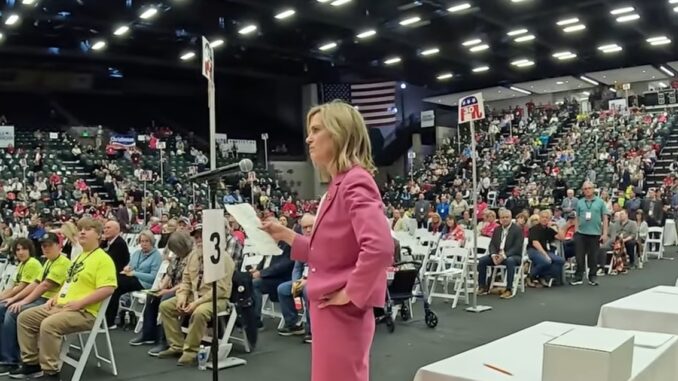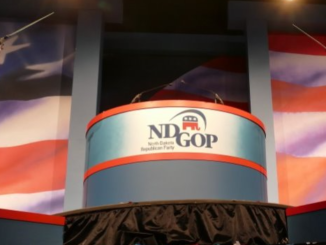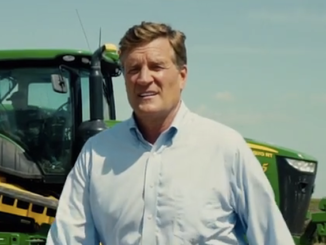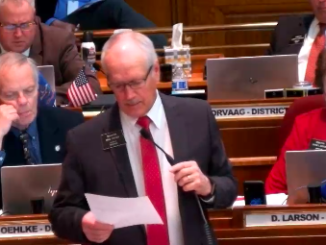
This last weekend, the party faithful for both the Republicans and Democrats in North Dakota gathered in Fargo — at separate locations of course — for their biennial state conventions. Events like these should be more consequential, but state law prohibits that from being so. How? Well, there’s this thing coming up in June that literally prohibits these private organizations from determining who represents them on the ballot in November. We all know it as the “primary”.
Among the items of business on a political party’s convention agenda is the endorsement of candidates for a variety of statewide offices. For Republicans this last weekend, just one of the eight offices that was up for the party’s endorsement had more than one candidate— the U.S. House race.
In that race, Public Service Commissioner Julie Fedorchak took on political newcomer Alex Balasz. When Balasz garnered more votes on the second round of balloting than Fedorchak — but just barely fell short of the needed majority — Fedorchak chose to drop, thereby giving the endorsement to Balasz.
Though Fedorchak’s bid for the endorsement ended in disappointment, she still filed the necessary signatures to appear on the June primary ballot. And she’s not the only Republican to do so. As I explained yesterday, former state representative Dr. Rick Becker was prohibited by party rules from seeking the endorsement, because he ran as an Independent for U.S. Senate in 2022. He’ll go to the June primary in hopes of securing the Republican nomination. Two other candidates also met yesterday’s filing deadline for U.S. House: political unknown Sharlet Mohr and former Miss America Cara Mund, who ran an independent campaign of her own in 2022. So, in all, the five of them will battle it out for who gets to move on to November as the Republican nominee.
Democrats will have two candidates on the June ballot for U.S. House. The endorsed candidate — Trygve Hammer — will face Roland Riemers for the Democratic nomination. It’s worth noting that in years past Riemers ran his campaigns as a Libertarian candidate.
Outgoing U.S. Congressman Kelly Armstrong (R-ND) announced his bid for governor back in January. The following month Lt. Governor Tammy Miller joined Armstrong in the race. At the time, she also expressed her intention to bypass the Republican convention— which she did. As a result, Armstrong was unopposed and automatically declared the endorsed candidate this last weekend. He’ll face Miller in the June primary.
My point in explaining all of this is simple— political parties do not get to choose who represents them in November’s general election. Now, I’m guessing that some of you don’t have a problem with this, but you should. After all, political parties are private organizations. And as such, they — and they alone — should determine who represents them on a ballot.
Let’s also not forget that North Dakota doesn’t have voter registration. It’s true that voters are required to vote for the candidates of just one party on a primary ballot. Yet, nothing prohibits a Democrat from crossing over and voting for Republicans— or vice versa. This can be extremely problematic. Just ask former state lawmaker Dan Johnston.
Johnston — a proven conservative — ran for State Treasurer in 2020. While he had the endorsements of outgoing Treasurer Kelly Schmidt, U.S. Senator Kevin Cramer, and even President Donald Trump; Johnston still lost by just over 5,000 votes to the more liberal Thomas Beadle. I know ardent Democrats who admitted to crossing over in the Republican primary in an effort to deny Johnston the nomination.
As I mentioned in an article five years ago, one of the arguments against determining nominees through a convention, instead of a primary, is that it will marginalize the electorate. I disagree with this assessment. It’s only true if people choose not to be involved.
The process used to determine a party’s endorsed candidates is publicized and open to all qualifying participants of the party. It’s true that delegate slots to a State Convention are limited, but it’s the party faithful (i.e. attendees) at District Conventions that elect those delegates to represent them. As it stands now, a significantly large number of those delegate spots go unfilled due to lack of interest in a process that can ultimately have its outcome changed by a primary vote.
If we want to talk about being marginalized, how do you suppose delegates feel when they attend a State Convention, work hard within the party to get their candidate(s) of choice endorsed, and then have it all upended in a primary election by a candidate who may not reflect the values and platform espoused by the party as well as the endorsed candidate did?
For me, the most important thing is this… these are private organizations. They alone should get to determine the process by which those who represent them are selected, not the state.
Candidates who cannot win a political party’s nomination — or simply have no political affiliation at all — would certainly be free to run as independents on a general election ballot. Ultimately, November elections will determine winners and losers.
Now, let me be clear. I don’t begrudge anyone from utilizing the system that we currently have to their benefit. Politics is — in a sense — a game, and we have to play the hand that’s dealt us. I just happen to think it’s time to shuffle the cards and provide these private organizations the hand that only they can rightfully play.
PLEASE LIKE & SHARE!
Sources:
- Rick Becker Wins the NDGOP Convention – The Minuteman Blog
- Former Miss America Cara Mund announces bid for US House as a Republican (kfyrtv.com)
- Kelly Armstrong, North Dakota’s lone congressman, runs for governor | AP News
- North Dakota lieutenant governor launches gubernatorial bid against congressman | AP News
- Why this North Dakota Republican is skipping her party’s convention (dailykos.com)
- Why I Support the NDGOP Resolution to Potentially Eliminate Primaries – The Minuteman Blog





